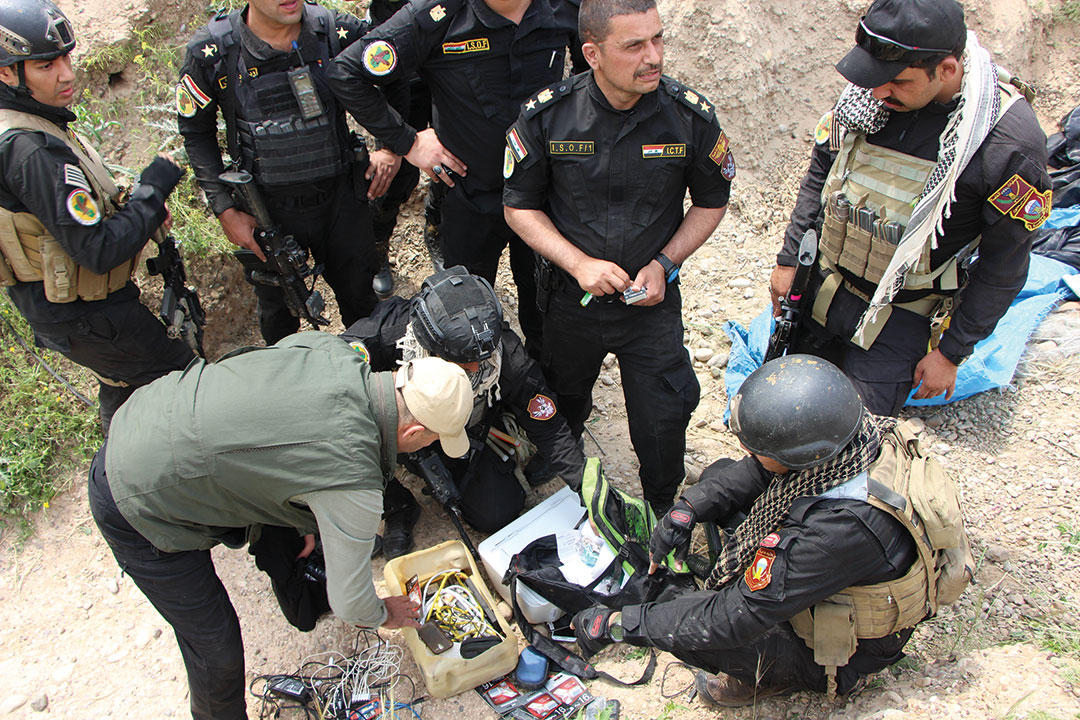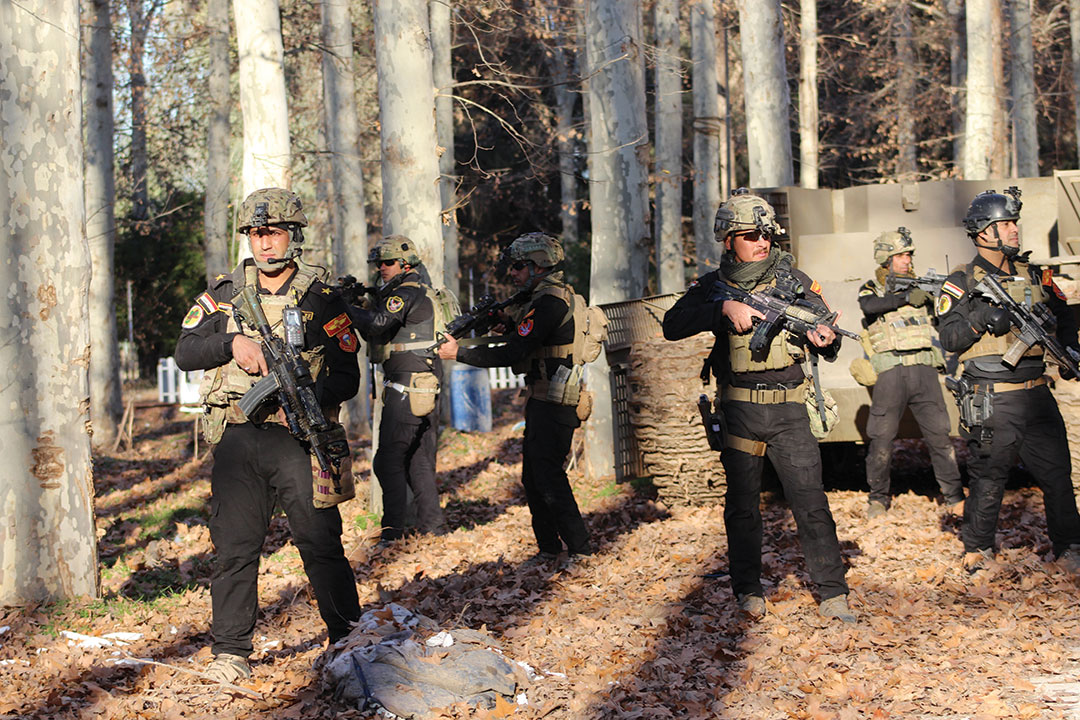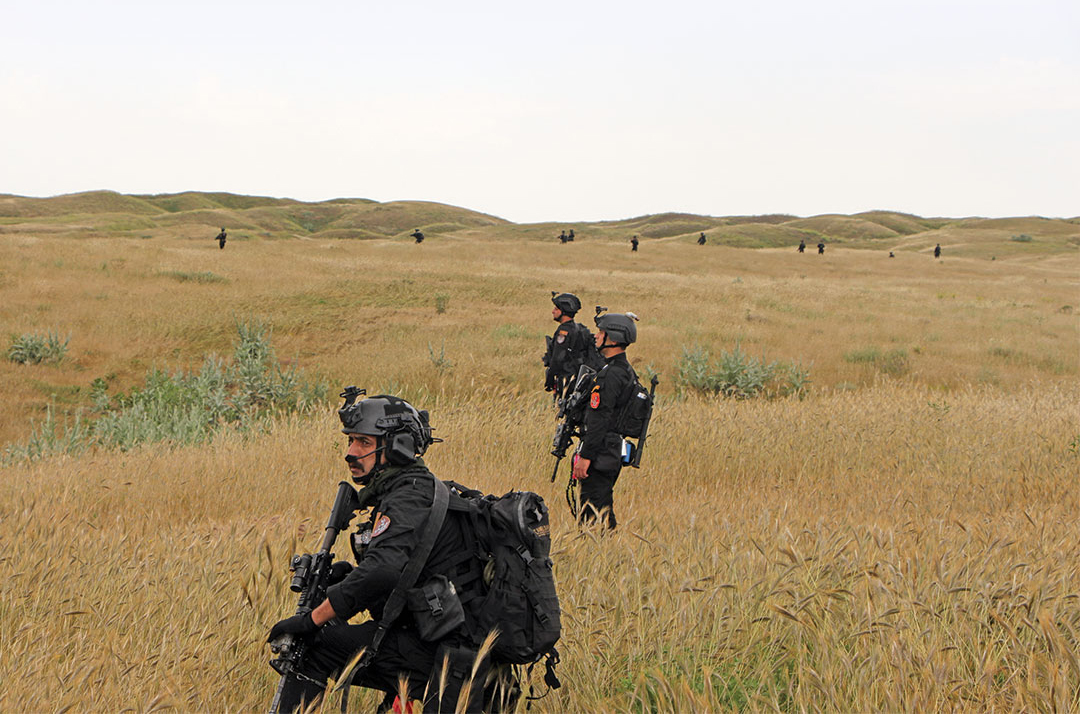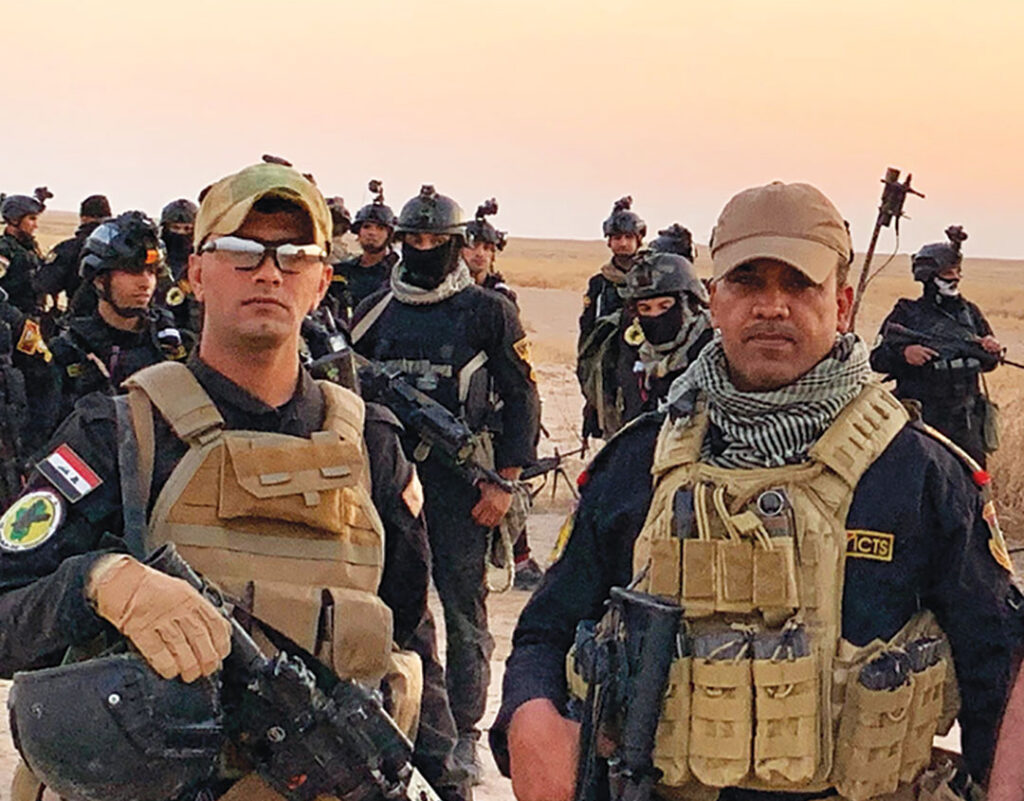The defeat of Daesh in Iraq provides tactical knowledge applicable to future conflicts
UNIPATH STAFF | Photos by Iraqi Counter Terrorism Service
Daesh’s invasion of large areas of Iraq was accompanied by a media campaign on social networking pages and satellite TV that managed to confuse public opinion and sow fear and anxiety in the hearts of the public. Among the many tales of the Iraqi Counter Terrorism Service’s (CTS’) bravery, the story of the Mosul Battalion stands out. This elite CTS unit fought valiantly at Camp Ghazlani and performed a full withdrawal from Mosul upon receiving orders to protect Camp Speicher in Salah al-Din province. Yet most do not know that Camp Speicher withstood 11 months of vicious attacks, and that it is thanks to the sacrifices of the men of CTS that Daesh terrorists were unable to storm the base. Unipath met with Col. Muntadher Al Shamari, CTS’ 2nd Special Operations Command chief of staff, to discuss the Mosul Regiment’s heroics during the defense of Camp Speicher and the battles of liberation.
Unipath: You were in Mosul during the city’s fall to Daesh. Give us an account of events leading up to your withdrawal from Mosul.
Col. Muntadher: A few days before the fall of Mosul, on June 6, 2014, Daesh launched an attack on Camp Ghazlani’s munitions depot containing large stockpiles of weapons and ammunition. After we repelled the attack, command instructed us to clear the area and secure the depots. The Daesh attack was fierce; among the attackers were suicide bombers wearing explosive vests. But we were able to eliminate the suicide bombers, successfully carry out the mission, and hand over the site to Iraqi security forces (ISF).
Because of the precarious security situation, we received orders to protect Mosul Airport and Camp Ghazlani. At the time, firefights between the terrorists and ISF inside the city were continuous. The sound of gunfire and explosions hadn’t stopped since the beginning of June. On June 9, Mosul was devoid of security forces, especially the right side of the city, leaving only the CTS battalion. In fulfilling the duty assigned to us, we held our positions despite enemy attempts to infiltrate the camp. We had been receiving orders and instructions from Maj. Gen. Karim Aboud al-Tamimi, then commander of 2nd Special Operations.
On the morning of June 10, orders came down for the battalion to withdraw from Camp Ghazlani to the Speicher military base in Salah al-Din to occupy the positions left by the CTS units sent to support the unit stationed at the Baiji oil refinery, which had been subject to repeated attacks by Daesh militants. Our withdrawal from Mosul was not smooth. All roads were under Daesh control. They dug holes, built dirt obstacles and planted improvised explosive devices along the road to block the progress of government forces. Because of this, it was a hard, drawn-out fight to break through enemy lines lasting nine hours and covering 140 kilometers. We reached Camp Speicher at full combat strength with all our equipment.
Unipath: Were you inside Camp Speicher when the Camp Speicher Massacre took place? Did terrorists enter the base?
Col. Muntadher: Speicher never fell to Daesh; our troops fought hard for 11 months in its defense until the liberation of Salah al-Din province from the terrorists. Many Soldiers stuck with us. The infamous Camp Speicher Massacre took place against defenseless young men who withdrew from Camp Speicher and Mosul to return to their homes in the south. After the main roads were cut, the men ended up in the orchards and villages around Camp Speicher. Terrorists captured anyone who got lost, rounded them up, and executed them in cold blood. This happened on June 11, 2014. What would later be called the Camp Speicher Massacre was carried out in a location outside of the camp, but the Daesh media machine marketed it as if its fighters took control of Camp Speicher and killed those inside.

Speicher is a strategic air base containing military division headquarters as well as weapons and munitions depots, so commanders decided to tighten its protection. When we arrived at Speicher on the evening of June 10, a day before the massacre, we witnessed mass desertion within the ranks of the units present. Soldiers, their morale gone, attempted to desert their posts after hearing gossip and rumors about what was going on around them. A few of the officers approached us wondering why we had come to Speicher. When we told them we were there to assist, they were relieved and asked us to stop the desertions. We rushed to the main road to try to talk to the deserting soldiers, hoping to change their minds. We did so in vain.
When we notified command of the situation, we received orders to persuade the fleeing Soldiers to stay with warnings about the risks of retreating through Daesh-controlled territory and the relative safety of the military base. There were a lot of them, but unfortunately, they didn’t take our advice and continued to defect from June 10 until the morning of June 11 while we were busy deploying the battalion, fortifying defensive positions, and preparing for the battle to defend Speicher.
Our battalion’s deployment within Camp Speicher and work fortifying defenses restored confidence and provided reassurance to the personnel of Army units who ordered their Soldiers to stay. We deployed the battalion along the camp’s outer perimeter and a few days later got reinforcements and supplies by helicopter. Command then assigned them to protect Speicher and ordered us to liberate the University of Mosul, so we carried out the orders and liberated the university, then took our position inside.
Unipath: Describe the battle to liberate Mosul.
Col. Muntadher: The battle to liberate Mosul was part of a series of battles that began with the liberation of Tikrit, Baiji and Qayyarah Airfield. But what set the Battle of Mosul apart was the large civilian presence and the many buildings and roads. This forced us to alter plans and tactics. We scaled down use of vehicles and armor in some areas and doubled it in others depending on the effectiveness of the weapons used and the expected civilian collateral damage. A civilian presence on the battlefield puts significant constraints on how battles can be fought and the speed with which they can be resolved. Protecting civilians from reprisals or from being taken as human shields and securing safe passage for their evacuation from the battlefield added a greater burden on our units charged with liberating the city.
Unipath: Did troops receive proper training and equipment before fighting in the Battle of Mosul?
Col. Muntadher: The battalion took part in and spearheaded most of the fighting. It had a strong foundation in training and armament, and because of that high degree of training, combat readiness and morale, it is a battalion known for courage and performance. We were part of several battles, the first of which was the liberation of Salah al-Din University. A few of our companies also took part in the Battle of Ramadi in 2014. Then came the Battle of Baiji and the liberation of the oil refinery. After clearing the surrounding villages, we went on to liberate Qayyarah and the strategic Qayyarah Airfield. At the time we were so busy fighting that we had no time to resume training, but we gained experience and came away from the battles of liberation with lessons applied on the ground in subsequent battles.
As for the Battle of Mosul specifically, it was an important fight that resonated in the media, both domestically and internationally. It was of particular importance to the Iraqi government and military leadership. Preparations for the battle, including forces, equipment and ammunition, were of great concern to everyone, so we only received training during the reorganization period after each battle.

Unipath: What was your role in the battle to liberate Mosul’s right bank and what challenges did you face there?
Col. Muntadher: At first, we advanced along the road leading to Camp Ghazlani and were tasked with clearing the Wadi Hajar area. Iraqi Federal Police were on our right flank and the remaining CTS forces were on our left. Usually our troops got to the staging area at least 24 hours before the attack so we could go over responsibilities, coordinate and consult with other participating units. But this time we didn’t have enough time as we moved from the left bank to the right bank shortly before the battle began to surprise the enemy, who was expecting our attack from the other side of the river. We were faced with several challenges, the first of which were the enemy’s fortifications, namely, multiple trenches, impediments and tunnels.
On top of that, the nature of the geography and difficult terrain made the task of detecting improvised explosive devices and land mines next to impossible as the enemy planted improvised explosive devices (IEDs) in a minefield pattern. In addition, Daesh fought desperately inside the city, relying on large groups of snipers, vehicle-borne IEDs, and suicide bombers. Daesh also threw its most loyal and fanatical foreign fighters into the fray. In the minds of Daesh, the Battle of Mosul was a decisive one, the results of which would determine whether or not the group would survive. The enemy deployed drones for the first time to drop small bombs on people, having previously used them only to monitor gatherings. Because the drones initially slowed our progress, we decided to go with plan B, so we advanced from an unexpected direction to surprise them and avoid impenetrable barriers laid down by Daesh defenders.
Unipath: How did you overcome these deadly challenges?
Col. Muntadher: We at CTS are constantly upgrading our equipment and vehicles. We put a steel cover on the vehicle-mounted machine gun tower and a steel cover to protect the wheels from snipers and drones. As for our handling of the drones, we were able to shoot down one of them and sought the expertise of coalition forces in electronic warfare. We delivered the wreckage to them, and they were able to gather important intelligence such as the drone’s frequencies, capabilities and range. They responded quickly with special jamming equipment effective to a range of 2 square kilometers. We stationed it at the front of the columns to protect them from drone attacks. We were able to bring down Daesh drones that approached our advancing troops, which was a shock to Daesh, which relied on drones to fight on the right bank.

Unipath: What was the impact of air support from coalition forces?
Col. Muntadher: Air support was impressive. We dedicated an air control officer to work with the international coalition team assigned to us. He worked around the clock relaying information from officers in the field to our coalition partners, who in turn provided the location of requested targets. Coalition forces’ response to Daesh targets was punishing and immediate. There were a few times when the response was slow owing to bad weather or the absence of available aircraft. Overall, however, our coalition partners played a critical role in the Battle of Mosul. Victory would not have been possible without their continuous support.
When we were in the thick of battle and heard the roar of coalition aircraft, we relaxed and morale rose. A spiritual relationship developed between fighter and warplane, which, despite the ferocity of the battle, gave the fighter the determination and energy to advance. Our confidence in the coalition’s aerial capabilities was high — we were reaching our objectives more quickly and with fewer casualties than expected. When we heard the roar of aircraft overhead and saw them hit targets in our path — which confused Daesh and caused them to start to break — we became increasingly determined and eager to end the battle.
Unipath: You’ve gained unparalleled experience in asymmetrical warfare through the liberation of cities. Have you been able to share experiences with other units or coalition forces that may need such experiences in places such as Yemen, Afghanistan or Somalia?
Col. Muntadher: The head of the Counter Terrorism Service’s instructions to all commanders is to focus on the training, development and education of fighters. We focus on fitness for all CTS Soldiers and on individual and group training. We also cultivate team spirit among Soldiers, because they live in barracks and fight like brothers. Most of our instructors are officers and noncommissioned officers with extensive training experience, particularly in preparing new recruits. Most of them have participated in liberation battles and have significant field experience, in addition to going to specialized courses outside Iraq.
As for training with coalition forces, we continue to train under coalition specialists. We have U.S. special forces teams at our base and continue to train with them. Experience sharing also continues at the highest levels. Coalition forces, led by U.S. troops, have been with us every step of the way, during every battle fought to cleanse Iraqi territory from the stain of Daesh. They were on the ground as advisors and in the air as fighters, so experience sharing occurred automatically by collective understanding of lessons learned in debriefings and by including each other in battle plans.
Col. Muntadher’s views remain as relevant as ever. As Daesh tries to regather its strength and adopt guerrilla warfare from hideouts in the mountains and deserts of northern and western Iraq, the country will continue to rely on the hard-won expertise of its elite military units to defeat terror.

